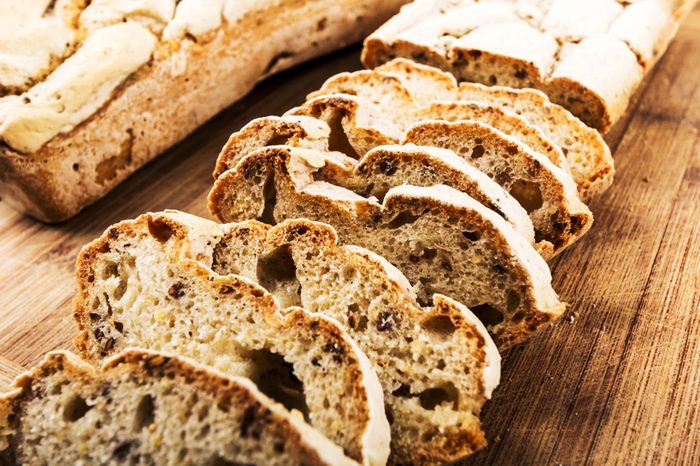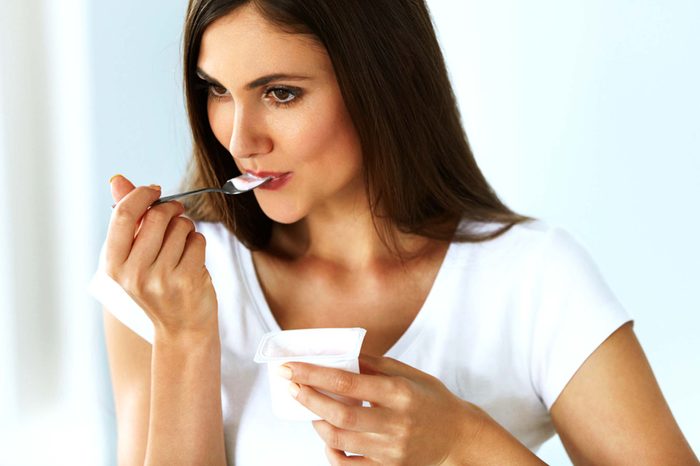What is a probiotic?
Probiotics are not your typical supplement like a vitamin or mineral: They’re actually bacteria or other microorganisms. But remember, they’re the “good” types of bacteria or yeast that exist naturally in your body and help keep it in balance. Probiotics are live microorganisms that, when present in adequate amounts, may offer health benefits, says Tsippora Shainhouse, MD, board-certified in both dermatology and pediatrics, and adjunct associate professor of dermatology at the University of Southern California. “Some benefits of probiotics are that they may be able to help prevent and even treat some infections and illnesses and promote healthy digestion and perhaps, a healthy immune system,” she explains. (Try adding these probiotic foods to your diet right now.)

Why are there so many different types of probiotics?
If you know anything about bacteria, you probably know that you possess a multitude of them. The bacteria in your body outnumber your human cells by about 3 to 1 ratio. And just like there are a lot of bacteria in your body, there are a lot of probiotics brands in your local pharmacy. Start with the U.S. Probiotic Guide to get a thorough look at the different types of probiotics that are available, advises Keith Ayoob, MD, an associate professor emeritus in the department of pediatrics (developmental medicine) at Albert Einstein College of Medicine, in New York. It lists the hundreds of different bacteria cultures, capsules, and varieties that are available.

What can probiotics do?
Primarily known as a remedy for gut ailments, probiotics gained their reputation by helping people tame the diarrhea that can follow a course of antibiotics, among other things. According to the International Foundation for Gastrointestinal Disorders, the probiotic Bifidobacterium infantis has been found to improve symptoms for people with irritable bowel syndrome (IBS). The probiotic can help with gas and bloating and other IBS symptoms. Probiotics may also help alleviate symptoms related to skin problems like acne; urinary infections; and even tooth decay and gum disease, according to the National Center for Complementary and Integrative Health.

Who should take a probiotic?
It’s important to have a conversation with your doctor about your goals while taking a probiotic, says Dr. Kogan, since most experts believe you shouldn’t be on them forever.
“I recommend them only as a temporary intervention, together with a healthy diet and lifestyle changes,” she explains. “This leads to a permanent healthy outcome, at which point the patient does not need to take anything anymore,” Dr. Kogan says. One time you should consider taking probiotics? After an illness. (Find out the benefits of probiotics after antibiotics.)
People on a special diet, like a gluten-free diet, may also be missing out on some helpful microorganisms such as yeast, says Svetlana Kogan, MD, board-certified in internal medicine and author of Diet Slave No More!.

You can get probiotic benefits from food
People who don’t regularly struggle with gut issues can still benefit from probiotics—and you don’t have to take a pill. Do you often find yourself bloating following a meal or know that you have a hard time digesting certain foods? Before you decide to invest in a daily probiotic, consider adding probiotic-filled foods into your diet, Dr. Ayoob says. “Start with yogurt and kefir, which have live and active cultures, are minimally processed, and can be included in most diets,” he says. “I also encourage people to eat more pre-biotic foods, which have different types of dietary fiber that feed the good bacteria in your body.” What does he recommend? “Some fantastic sources are onions, garlic, all fruits, vegetables, whole grains, and legumes.”

If you’re buying pills, read the label
Pay attention to what is in your probiotic just like you check food labels to avoid certain ingredients. “Look for a reputable manufacturer with many different strains of probiotics represented, and a strong potency (around 40-50 colony-forming units (CFUs)) if you are taking it because of antibiotic treatment,” Dr. Kogan says. There is no Food and Drug Administration regulation of supplements, she warns. However, ConsumerLab.com tests all supplements and publishes their results online, making it simple for you to get info on the effectiveness of a probiotic. Also, check with your doctor before adding anything new to your diet. This is not only to get their opinion based on your medical history, but for their recommendations, too. (Find out how to pick the best probiotic for weight loss.)

Be patient
Probiotics aren’t supercharged pharmaceuticals, and restoring a healthy balance to your body will take time. If you have IBS or constipation, taking one probiotic isn’t going to work magic overnight. “This is a process, so things may take weeks to produce a benefit. The gut environment cannot change overnight,” Dr. Ayoob says. “You want to grow more good bacteria, but the idea is to help your gut do what it is made to do, grow its own good environment.”
